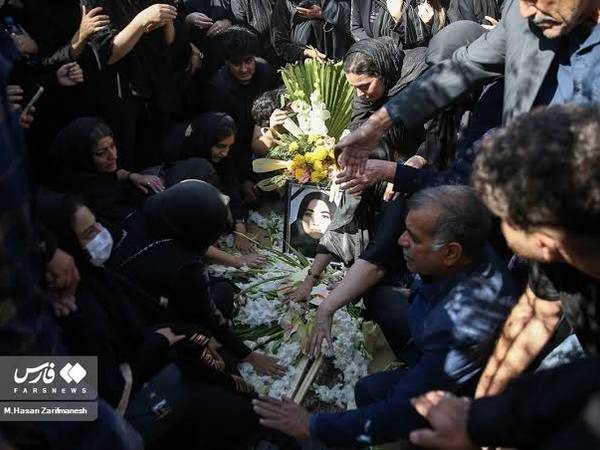Iran’s security forces and agents assaulted and detained dozens at Armita Geravand’s funeral on Sunday, including the prominent rights lawyer, Nasrin Sotoudeh.
Sotoudeh, who had previously denounced Armita's death as a "state killing" in a Facebook post, attended the funeral without a head covering. She was apprehended alongside Manzar Zarrabi, a mother who lost four family members in the tragic downing of a Ukrainian airliner over Tehran in 2020, as well as numerous other women and men.
Initially, Sotoudeh was taken to a detention center in Shahr-e Ray, located in southern Tehran, and then transferred to the infamous Vozara Detention Center in North Tehran. It's worth noting that Mahsa Amini fell into a coma at this facility last year and ultimately lost her life, sparking months of anti-regime protests.
According to Sotoudeh’s husband, Reza Khandan, his wife and other detained women have now arrived at the infamous Qarchak Prison in the south of the capital, but Zarrabi who suffered a convulsive episode was freed.
Khandan who spoke to his wife on the phone briefly when she was at Vozara says both women who refused to wear the hijab as demanded by the agents were assaulted even more badly and that his wife has been rejecting food and her medication in detention.
Prominent Female Islamic Scholar Sedigheh Vasmaghi who in an open letter to Supreme Leader Ali Khamenei strongly challenged his edict over hijab was also assaulted by four agents after the funeral but was reportedly rescued by other people at the scene.
Vasmaghi who used to wear a black veil for years now appears with no hijab. She has argued that there is no evidence in Sharia that women must cover their hair. She has become a campaigner for abolition of compulsory hijab.
“We will establish women’s freedom to choose their clothing to honor the deaths of Mahsa and Armita,” she wrote in an Instagram post Sunday after the assault.
According to Hengaw Organization for Human Rights, a member of the Cooperation Council of Iranian Teachers’ Unions, Masoud Zeinalzadeh, and Mohammad Geravand, one of Armita’s relatives, were among those detained at the funeral.
Activist and former political prisoner Shahriar Shams was among those beaten by plainclothesmen after the funeral.
“They took him into their van and demanded his mobile passcode. They beat him up badly when he refused to do so … Then they searched his backpack … They took his cash to let him go and told him he had to pay for his freedom. We took him to the hospital tonight and the doctor said he must get an MRI due to the possibility of [serious] neck injury,” Ali Nanvayi, Shams’ friend,wrote on X.
Students in several universities on Monday honored Armita Geravand whose death was announced after twenty-eight days of coma by hanging posters on the walls and graffiti.
At Tehran’s prestigious Sharif University of Technology, the Islamic Association of Students posted photos of Armita, Mahsa Amini, Nika Shakarami, Sarina Esmailzadeh, and other young girls killed during last year’s nationwide protests on their notice board.
One of the posters on the board, which was later cleared by the university security, simple asked, “Did Armita Geravand Die [or Got Killed]?” while another said, may the day come when God reveals his punishment so “child-killers cannot find fault with other child-killers”.
This could be a reference to the Islamic Republic, which has never taken responsibility for the deaths of these teenagers and tried to justify them with far-fetched scenarios such as suicide and falling from rooftops that few have believed, calling Israel “the child-killing regime”.
